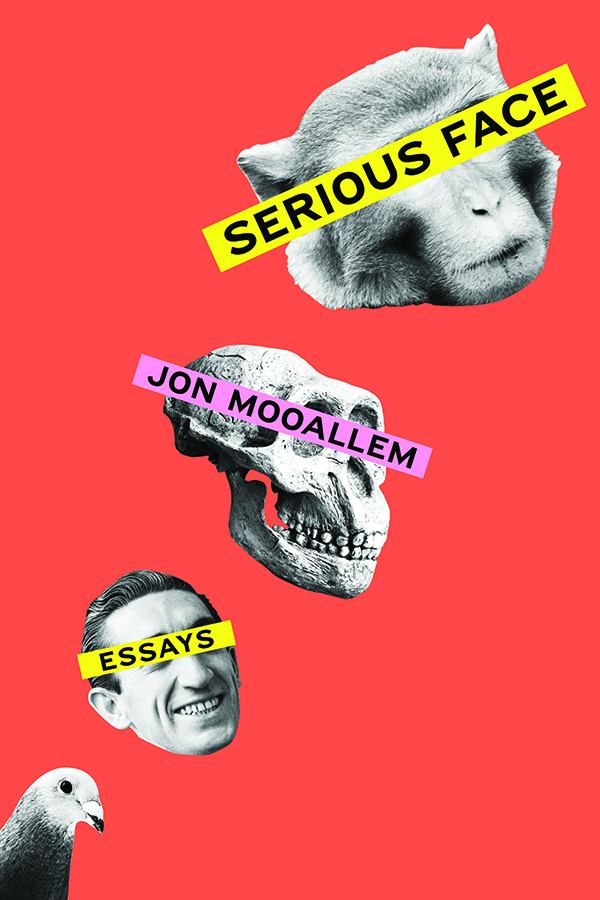The magazine world isn’t what it used to be. If you read a killer piece from the Atlantic or Harper’s or the New Yorker, you’re more likely to receive it as an alert on your phone than at a newsstand. (Remember newsstands? Good times.) Consequently, you might not find or create the time to really soak in the masters of the craft, the writers with a command of structure and pacing, of language and voice and reporting. These writers are every bit as gifted as the best novelists. What’s more, they must operate within the boundaries of truth.

Jon Mooallem is one of those masters, a writer who was born to do what he does. His stories, 13 of which are collected in the new book Serious Face, are mini-master classes in curiosity and empathy, quietly but colorfully probing the qualities that make us human. They are billed as “essays,” and I suppose they are, but to a journalist, they’re more like epic feature stories, deeply reported over a long period of time. To the extent that Mooallem becomes his own subject, he generally stays on the periphery, with a couple of worthy exceptions. He’s far more interested in other people than in himself.
He’s particularly interested in subjects embodying or living on extremes — of natural disaster, of artistic expression, of physical endurance. In “We Have Fire Everywhere,” he plops us down in the middle of the 2018 Camp Fire that killed 85 and destroyed most of the Sierra Nevada town of Paradise. We meet Joe Kennedy, the bulldozer driver who cranked up the metal band Pantera as he frantically plowed through burning cars and houses to create fire-free spaces, and the bluntly hysterical Tamra Fisher, who finds safety and solace in a stranger’s pickup truck. Here’s Mooallem’s lead: “The fire was already growing at a rate of one football field per second when Tamra Fisher woke up on the edge of Paradise, California, feeling that her life was no longer insurmountably strenuous or unpleasant and that she might be up to the challenge of living it again.” With its interiority and specificity, this could be the start of a short story, but it’s actually the result of dogged reporting, knowing how to ask which questions and using the answers to paint a vivid picture. Mooallem is a case study in how great journalism leads to great writing.
When Mooallem does go down a rabbit hole, he makes it worth the reader’s while to follow. In “This Story About Charlie Kaufman Has Changed,” which, like the rest of the pieces in the collection, originally ran in the New York Times Magazine, he gets self-referential with Charlie Kaufman, the filmmaker “known for films so rich with surreality and self-referential lunacy that they feel as if they might be spun apart by the force of their strangeness, yet miraculously cohere.” Mooallem originally planned a standard profile of the Being John Malkovich screenwriter, pegged to his 700-page novel. Then, COVID-19 hit. Both lonely, Mooallem and Kaufman took to talking on the phone for hours at a time. They struck up some kind of relationship — friendship? Mutual therapy? — and grew fascinated by whatever it was they were doing. In true Kaufman fashion, Mooallem ended up writing a story largely about trying to write a story, which is a pretty good description of Kaufman’s Adaptation screenplay. “I was terrified of being called self-indulgent,” Mooallem writes. “But we agreed that whatever I turned in would have to face head-on the weirdness of the circumstances that produced it.” Mooallem’s writing has an improvisational tone, but his stories have so many moving parts that they also seem carefully mapped.
He’s got a touch of anthropologist about him, an eagerness to enter strange new places or situations, and a detective’s instinct that compels him to explore the conflicts that keep them humming. In “Can You Even Believe This Is Happening (A Monk Seal Murder Mystery),” he touches down in Hawaii, where the native monk seal, which has “wiry whiskers and the deep, round eyes on an apologetic child,” is being killed off, often in gruesome fashion, by residents. Who would murder a monk seal? It turns out there’s quite a bit of resentment toward the massive creatures, which make life difficult for fishermen and enjoy layers of protection from government and conservation agencies. He finds communities who feel they’re being left behind and neglected while the monk seal gets preferential treatment. Why should you care? Because Mooallem does, and his curiosity convinces us that we should, too. This is a pure writerly gift: the ability to convey passion about a subject most readers would otherwise never glance at.
Great writers run the risk of falling in love with their own language, and Mooallem is no exception. From the fire story: “Embers darted by like bioluminescent fish.” Like what now? The only reason such sentences stick out here is that they’re rare. There’s very little ostentatious about Mooallem. His references, his similes, needn’t be bioluminescent. They shine plenty as is.
Chris Vognar is a culture writer living in Houston.
